 W
WAdmiral Sir Thomas Allin, 1st Baronet (1612–1685) was an officer of the Royal Navy who saw service in the English Civil War, and the Second and Third Anglo-Dutch Wars. A Royalist during the Civil War, he returned to service after the Restoration and eventually rose to the rank of Admiral of the White after serving under some of the most distinguished military figures of the era, including Prince Rupert of the Rhine.
 W
WArthur Annesley, 1st Earl of Anglesey PC was an Anglo-Irish royalist statesman. After short periods as President of the Council of State and Treasurer of the Navy, he served as Lord Privy Seal between 1673 and 1682 for Charles II. He succeeded his father as 2nd Viscount Valentia in 1660, and he was created Earl of Anglesey in 1661.
 W
WSir Thomas Aylesbury, 1st Baronet (1576–1657) was an English civil servant, Surveyor of the Navy from 1628 and jointly Master of the Mint from 1635, and a patron of mathematical learning. He was the great-grand father of two British Queens, Anne and Mary II.
 W
WAdmiral of the Fleet Matthew Aylmer, 1st Baron Aylmer, of Covent Garden, Westminster, and Westcliffe, near Dover, was an Anglo-Irish Royal Navy officer and Whig politician who sat in the English and British House of Commons between 1695 and 1720.
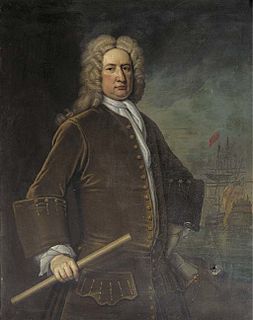 W
WJohn Baker was an officer of the Royal Navy and politician who sat in the House of Commons between 1713 and 1716. He rose to the rank of vice-admiral after service in the Nine Years' War and the War of the Spanish Succession.
 W
WBasil Beaumont, rear-admiral, was the fifth son, amongst the twenty-one children, of Sir Henry Beaumont, of Stoughton Grange and Cole Orton.
 W
WJohn Benbow was an English officer in the Royal Navy. He joined the navy aged 25 years, seeing action against Algerian pirates before leaving and joining the merchant navy where he traded until the Glorious Revolution of 1688, whereupon he returned to the Royal Navy and was commissioned.
 W
WAdmiral Sir John Berry was an English naval officer of the Royal Navy, and was in 1675 the captain of the annual convoy to Newfoundland that took place during the years of the colony's founding. Berry's advocacy of the right of the small number of settlers to remain in Newfoundland, which was opposed by the British Committee for Trade and Plantations, was an important factor in determining the future course of European settlement in Newfoundland.
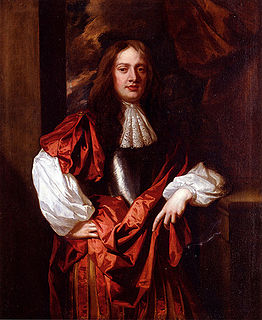 W
WCaptain Charles Bertie, of Uffington, near Stamford, Lincolnshire, was a British administrator, diplomat, and Tory politician who sat in the English and British House of Commons between 1678 and 1711. He rose to serve as Secretary to the Treasury under his brother-in-law, the Earl of Danby, from 1673 until 1679 but did not wield significant political power thereafter. He did, however, twice enjoy the office of Treasurer of the Ordnance before his death in 1711.
 W
WGeneral at Sea Robert Blake was an important naval commander of the Commonwealth of England and one of the most famous English admirals of the 17th century. His successes have been considered to have "never been excelled, not even by Nelson" according to one biographer. Blake is recognised as the chief founder of England's naval supremacy, a dominance subsequently inherited by the British Royal Navy into the early 20th century. Despite this, due to deliberate attempts to expunge the Parliamentarians from history following the Restoration, Blake's achievements tend not to receive the full recognition that they deserve.
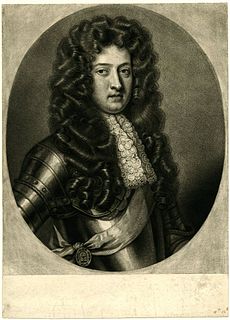 W
WJohn Egerton, 3rd Earl of Bridgewater KB PC was a British nobleman from the Egerton family.
 W
WFulke Greville, 1st Baron Brooke, de jure 13th Baron Latimer and 5th Baron Willoughby de Broke KB PC, known before 1621 as Sir Fulke Greville, was an Elizabethan poet, dramatist, and statesman who sat in the House of Commons at various times between 1581 and 1621, when he was raised to the peerage.
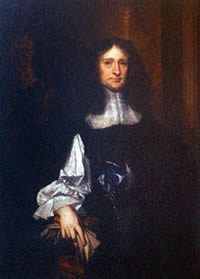 W
WVice Admiral Sir George Carteret, 1st Baronet was a royalist statesman in Jersey and England, who served in the Clarendon Ministry as Treasurer of the Navy. He was also one of the original lords proprietor of the former British colony of Carolina and New Jersey. Carteret, New Jersey, as well as Carteret County, North Carolina, both in the United States, are named after him. He acquired the manor of Haynes, Bedfordshire, in about 1667.
 W
WAdmiral of the Blue George Churchill was an English naval officer, who served as a Lord Commissioner of the Admiralty from 1699 to 1702 and sat on the Lord High Admirals Council from 1702 to 1708. He was Member of Parliament for St Albans from 1685 to 1708, then Portsmouth from 1708 until his death in 1710.
 W
WCaptain Wolfran Cornewall was an officer in the British Royal Navy.
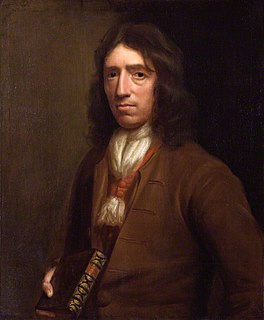 W
WWilliam Dampier was an English explorer, pirate, and navigator who became the first Englishman to explore parts of what is today Australia, and the first person to circumnavigate the world three times. He has also been described as Australia's first natural historian, as well as one of the most important British explorers of the period between Sir Walter Raleigh and James Cook.
 W
WSir Anthony Deane FRS (1633–1721) was a 17th-century mayor of Harwich, naval architect, Master Shipwright and commercial shipbuilder, and Member of Parliament.
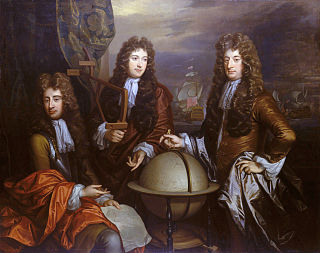 W
WAdmiral Sir Ralph Delaval (c.1641–c.1707) was an English admiral.
 W
WAdmiral William Feilding, 1st Earl of Denbigh was an English naval officer and courtier.
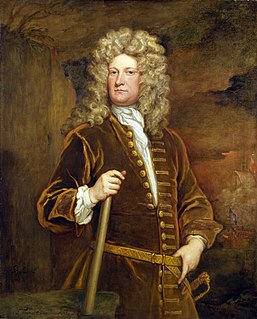 W
WRear Admiral Sir Thomas Dilkes was an officer in the Royal Navy.
 W
WJohn Evelyn was an English writer, gardener and diarist.
 W
WAdmiral of the Fleet Sir Stafford Fairborne was a Royal Navy officer and Whig politician. As a captain he saw action in command of various ships at the Battle of Beachy Head, at the Battle of Barfleur and at the Battle of Lagos during the Nine Years' War.
 W
WRobert Fairfax was a rear admiral and politician.
 W
WHenry FitzRoy, 1st Duke of Grafton, was an illegitimate son of King Charles II of England and his mistress Barbara Villiers. A military commander, Henry FitzRoy was appointed colonel of the Grenadier Guards in 1681 and Vice-Admiral of England from 1682 to 1689. He was killed in the storming of Cork during the Williamite–Jacobite War in 1690.
 W
WHenry Greenhill was a British mariner, Governor of the Gold Coast, commissioner of the navy and Member of Parliament.
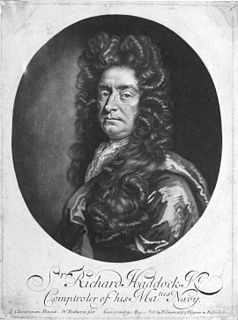 W
WSir Richard Haddock was an officer of the Royal Navy. He served during the Anglo-Dutch Wars, eventually rising to the rank of Admiral in August 1690. In Herge's Adventures of Tintin, Richard Haddock was one of the inspirations for Captain Haddock's 17th century ancestor, Sir Francis Haddock.
 W
WPeter Heywood was a British naval officer who was on board HMS Bounty during the mutiny of 28 April 1789. He was later captured in Tahiti, tried and condemned to death as a mutineer, but subsequently pardoned. He resumed his naval career and eventually retired with the rank of post-captain, after 29 years of honourable service.
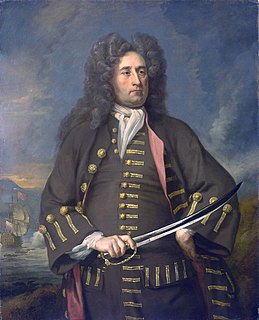 W
WSir Thomas Hopsonn or Hopson was an English naval officer and member of parliament. His most famous action was the breaking of the boom during the battle of Vigo Bay in 1702. After retiring from active service, he became a Navy Commissioner and the governor of Greenwich Hospital.
 W
WSir John Jennings was a Royal Navy officer and Whig politician who sat in the English and British House of Commons between 1705 and 1734. He commanded HMS Kent at Cadiz and Vigo in 1702 during the War of the Spanish Succession. He went on to be Commander-in-Chief of the Jamaica Station, then Senior Naval Lord and finally Governor of Greenwich Hospital.
 W
WSir Joseph Jordan was a naval officer and admiral. From a Thames shipowning family, he is initially recorded as importing tobacco from Nevis and Barbados aboard the Amity.
 W
WVice-Admiral Peregrine Osborne, 2nd Duke of Leeds, styled Viscount Osborne between 1673 and 1689, Earl of Danby between 1689 and 1694 and Marquess of Carmarthen between 1694 and 1712, was an English Tory politician.
 W
WThomas Osborne, 1st Duke of Leeds,, was a prominent English politician. Under King Charles II, he was the leading figure in the government for around five years in the mid 1670s. He fell out of favour due to corruption and other scandals, and was impeached and eventually imprisoned in the Tower of London for five years until the accession of James II of England in 1685. In 1688 he was one of the Immortal Seven group that invited William III, Prince of Orange to depose James II as monarch during the Glorious Revolution. He was again the leading figure in government, known at the time as the Marquess of Carmarthen, for a few years in the early 1690s.
 W
WSir Richard Leveson was an important Elizabethan Navy officer, politician and landowner. His origins were in the landed gentry of Shropshire and Staffordshire. A client and son-in-law of Charles Howard, 1st Earl of Nottingham, he became Vice-Admiral under him. He served twice as MP for Shropshire in the English parliament. He was ruined by the burden of debt built up by his father.
 W
WSir Robert Mansell (1573–1656) was an admiral of the English Royal Navy and a Member of Parliament (MP), mostly for Welsh constituencies. His name was sometimes given as Sir Robert Mansfield and Sir Robert Maunsell.
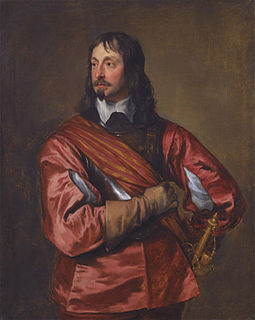 W
WVice Admiral Sir John Mennes, was an English naval officer who went on to be Comptroller of the Navy.
 W
WSir John Munden was a rear-admiral in the Royal Navy who was dismissed from the service for having failed to engage a French fleet, despite having been acquitted by a court-martial of any misconduct in the matter.
 W
WAdmiral of the Fleet Edward Russell, 1st Earl of Orford, PC was a Royal Navy officer and politician. After serving as a junior officer at the Battle of Solebay during the Third Anglo-Dutch War, he served as a captain in the Mediterranean in operations against the Barbary pirates.
 W
WSir John Penington (1584?–1646) was an English admiral who served under Charles I of England.
 W
WSir William Penn was an English admiral and politician who sat in the House of Commons from 1660 to 1670. He was the father of William Penn, founder of the Province of Pennsylvania.
 W
WSamuel Pepys was an administrator of the navy of England and Member of Parliament who is most famous for the diary he kept for a decade while still a relatively young man. Pepys had no maritime experience, but he rose to be the Chief Secretary to the Admiralty under both King Charles II and King James II through patronage, diligence, and his talent for administration. His influence and reforms at the Admiralty were important in the early professionalisation of the Royal Navy.
 W
WPeter Pett, was an English Master Shipwright, and Second Resident Commissioner of Chatham Dockyard. He is noted for the incident concerning the protection of his scale models and drawings of the King's Fleet during the Dutch Raid on the Medway, in Kent in June 1667, during the Second Anglo-Dutch War.
 W
WPhineas Pett was a shipwright and First Resident Commissioner of Chatham Dockyard and a member of the Pett dynasty. Phineas left a memoir of his activities which is preserved in the British Library and was published in 1918.
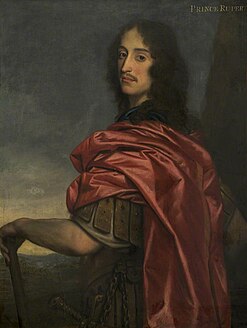 W
WPrince Rupert of the Rhine, Duke of Cumberland, was a German-English army officer, admiral, scientist and colonial governor. He first came to prominence as a Royalist cavalry commander during the English Civil War. Rupert was the third son of the German prince Frederick V of the Palatinate and Elizabeth, eldest daughter of James VI of Scotland and I of England.
 W
WEdward Montagu, 1st Earl of Sandwich, KG, FRS was an English landowner, infantry officer, and later naval officer and politician, who sat in the House of Commons at various points between 1645 and 1660. He served Oliver Cromwell loyally in the 1650s, but went on to play a considerable part in the Restoration of King Charles II, and was subsequently rewarded with several court offices. Sandwich served as the English ambassador to Portugal from 1661 to 1662, and the ambassador to Spain from 1666 to 1668. He later became an admiral, serving in the two Anglo-Dutch Wars during the reign of Charles II; he was killed at the Battle of Solebay. A detailed primary source for Sandwich's career in the 1660s is the diary of Samuel Pepys, who was his cousin and protégé.
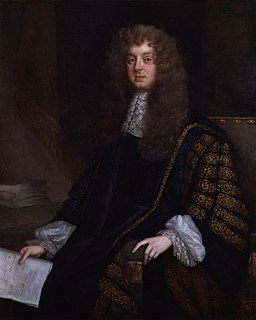 W
WSir Edward Seymour, of Berry Pomeroy, 4th Baronet, MP was a British nobleman, and a Royalist and Tory politician.
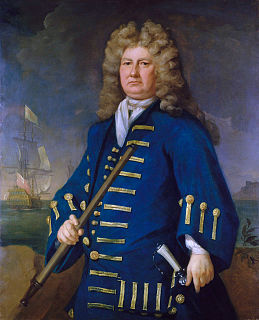 W
WAdmiral of the Fleet Sir Cloudesley Shovell was an English naval officer. As a junior officer he saw action at the Battle of Solebay and then at the Battle of Texel during the Third Anglo-Dutch War. As a captain he fought at the Battle of Bantry Bay during the Williamite War in Ireland.
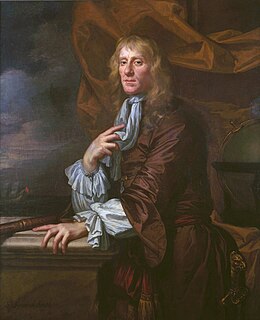 W
WSir Jeremiah Smith was an officer of the Royal Navy who saw service during the First and Second Anglo-Dutch Wars, rising to the rank of admiral.
 W
WSir George Somers was an English privateer and naval hero, knighted for his achievements and the Admiral of the Virginia Company of London. He achieved renown as part of an expedition led by Sir Amyas Preston that plundered Caracas and Santa Ana de Coro in 1595, during the undeclared Anglo-Spanish War. He is remembered today as the founder of the English colony of Bermuda, also known as the Somers Isles.
 W
WGeorge St Lo was an officer of the Royal Navy who saw service during the Nine Years' War, and the War of the Spanish Succession. His career cut short by injuries, he embarked on a political career, holding offices as a commissioner of the navy and was a Member of Parliament.
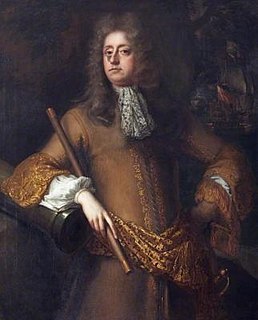 W
WAdmiral Arthur Herbert, 1st Earl of Torrington was an English admiral and politician. Dismissed by King James II in 1688 for refusing to vote to repeal the Test Act, which prevented Roman Catholics from holding public office, he brought the Invitation to William to the Prince of Orange at The Hague, disguised as a simple sailor. As a reward he was made commander of William's invasion fleet which landed at Torbay in Devon on 5 November 1688 thus initiating the Glorious Revolution.
 W
WSir Henry Vane was an English politician, statesman, and colonial governor. He was briefly present in North America, serving one term as the Governor of the Massachusetts Bay Colony, and supported the creation of Roger Williams' Rhode Island Colony and Harvard College. A proponent of religious tolerance, he returned to England in 1637 following the Antinomian controversy. As governor, he defended Anne Hutchinson and her right to teach religious topics in her home which put him in direct conflict with the Puritan leaders in the Massachusetts Colony. Eventually, Mrs. Hutchinson was banned from the colony.
 W
WEdward Cecil, 1st Viscount Wimbledon was an English military commander and a politician who sat in the House of Commons at various times between 1601 and 1624.